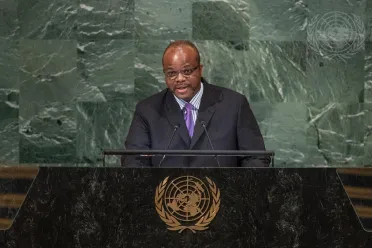Statement
Statement summary
MSWATI III, King of Eswatini, welcoming that the countries of the world united to fight the COVID-19 pandemic — and that the United Nations was instrumental in these efforts — pointed out that, despite challenges, some positive developments also occurred. Eswatini, for its part, was compelled to develop testing laboratories and oxygen-storage facilities, which will help combat other health issues. It has also made great strides in the fight against HIV/AIDS — achieving the Joint United Nations Programme on HIV/AIDS’ 95-95-95 testing and treatment targets — and is now focusing on ending the HIV/AIDS pandemic as a global health threat by 2030. Noting that the COVID-19 pandemic resulted in the collapse of many economies, the shutdown of industries and the disruption of projects designed to alleviate poverty, he stressed that, as COVID-19 is subsiding, the international community must renew its focus on implementing the Sustainable Development Goals, which will play a crucial role in helping countries to develop.
He also emphasized that financial institutions must assist countries in the recovery process, as many face challenges in raising the necessary resources. Urging such institutions to remain open to supporting countries in need and reviving development programmes, he expressed hope that the world will come together to resolve some of these problems. Eswatini continues its efforts to attract investment and support small- and medium-sized enterprises and, in doing so, realizes the need for reliable energy to help achieve investment goals. It also focuses on remaining highly competitive, and the Government has implemented fiscal-support measures to reduce the costs of establishing and initially operating a business through both fiscal and non-fiscal incentives. Further, Eswatini is well-positioned as a launchpad for the African Continental Free Trade Area, which seeks to boost intra-Africa trade in a market of 1.2 billion people with a combined gross domestic product of $2.2 trillion.
He went on to say that ensuring food security is a priority for his country and, to this end, that the Government has increased budget allocations, distributed emergency food aid and provided cash transfers to the elderly, the vulnerable, schools food programmes and other support services for disadvantaged populations. Public investment has also driven agriculture projects, including the acceleration of water harvesting and irrigation development. It has also created market-growth opportunities for small and emerging farmers to enhance their livelihoods, built more dams to counteract the negative effects of climate change and established input subsidies for staple food crops. The combination of these efforts, he noted, has increased the production of maize by 30 per cent in the 2021-2022 farming season — only 9 per cent short of the national target.
“With global stability at stake, Africans have recognized the need to guard against opportunists who seek to take advantage of fragile economies to advance their agendas,” he said, turning to Security Council reform. Africa must have permanent representation in that organ, as societies are founded according to different cultural norms and values and the United Nations must incorporate the perspective of the African polity. He also pointed out that, during the COVID-19 pandemic, Taiwan was unable to access some of the World Health Organization’s (WHO) programmes and implement remedies that required approval by the same. He therefore urged that Taiwan be considered for full participation in United Nations agencies, also calling on the United Nations to make the necessary arrangements for Taiwan to significantly participate in relevant specialized United Nations mechanisms.
“Eswatini remains confident in the global body’s capability to confront and overcome the challenges we face, because most of them are manmade,” he said, noting that this can be achieved through full commitment to the ideals of the Charter of the United Nations. Success hinges on unity and respect for all, he added, emphasizing that: “Despite our diversity, we are one big family”. In this, the international community must give the people of the world hope and confidence that the United Nations has the mandate to play its role in global issues that affect all of mankind.
Full statement
Read the full statement, in PDF format.
Photo

Previous sessions
Access the statements from previous sessions.
